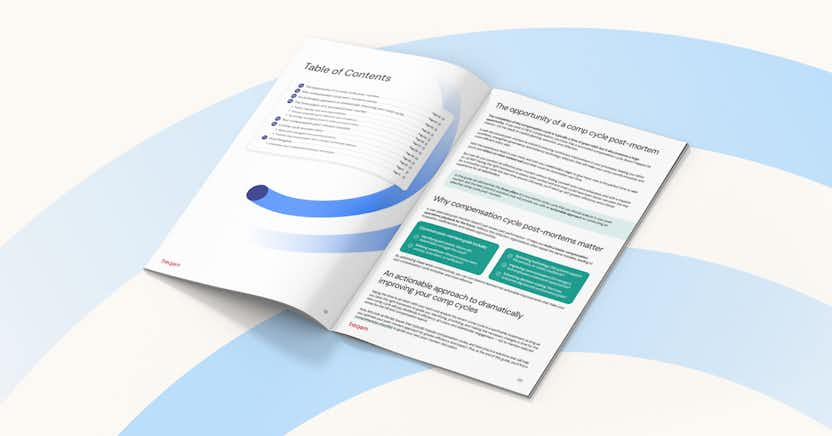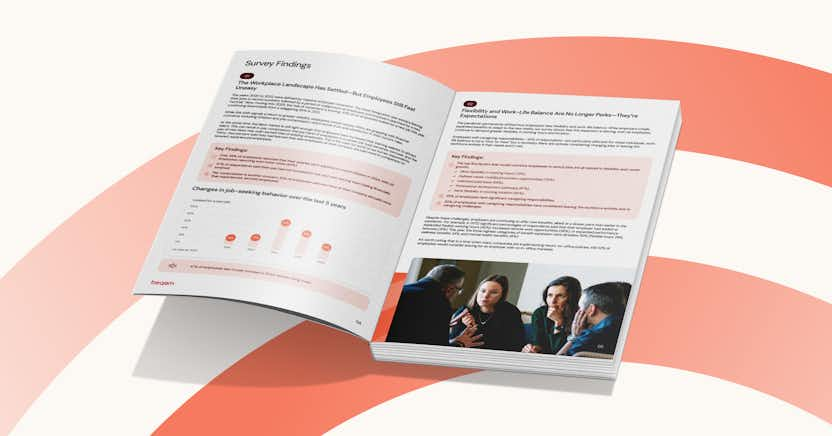A Crisis in Compensation Clarity

Research reveals a crisis—and an opportunity
Research from beqom’s 2025 Compensation and Culture Report highlights a growing crisis in pay transparency: employees don’t understand how they are compensated. While 69% of employees know their total monetary compensation, only 38% understand how it is calculated. This gap in understanding isn’t just a minor inconvenience—it erodes trust, fuels dissatisfaction, and increases turnover risk.
Yet, within this crisis lies a tremendous opportunity. Organizations that embrace transparency and empower employees with clear, data-backed compensation insights can build stronger engagement, improve retention, and position themselves as employers of choice. With pay transparency laws evolving and employee expectations rising, HR leaders who act now will gain a significant competitive edge.
Ensuring compensation awareness strengthens engagement
Imagine putting in months of hard work, only to have no real understanding of how your pay was determined. Did you receive a fair raise? Were your performance and contributions properly valued? Without clear answers, it’s easy to feel undervalued—even if the compensation is fair.
A surprising number of employees face this exact uncertainty. According to our research:
- 31% of employees don’t know their total monetary compensation, including benefits. This means nearly a third of the workforce may not realize the full value of what their employer provides.
- 62% don’t understand how their pay is determined. Without clarity, employees may suspect that salary decisions are arbitrary or biased.
- 47% of employees saw no pay increase in 2024. This is particularly concerning in an era of inflation and rising living costs.
Why does this matter?
When employees don’t fully understand their compensation, they often assume they are underpaid—even when they’re not. We humans tend to be suspicious. This perception can lead to:
- Decreased perceived value: Employees who don’t see the full picture of their compensation package might underestimate their total earnings, making them more receptive to external job offers that seem better on the surface.
- Eroded trust: A lack of transparency can make employees feel that employers are withholding information, leading to skepticism and disengagement.
- Higher turnover risk: Employees who believe they are being treated unfairly are more likely to look elsewhere for opportunities, even if their total compensation is competitive.
💡 What can organizations do?
To combat these issues, HR leaders must proactively communicate compensation details. A few key strategies include:
- Providing total compensation statements: Regularly distribute clear breakdowns of salary, bonuses, benefits, and perks so employees see the full value of their compensation.
- Leveraging HR technology: Use compensation management software to give employees real-time access to their pay structure and benefits, and performance management software to deliver merit-based performance reviews.
- Holding pay transparency discussions: Offer workshops or one-on-one sessions where employees can ask questions and gain clarity on how their compensation is structured.
By making compensation clearer and more accessible, companies can foster stronger employee trust and engagement.
Understanding pay calculations leads to trust
It’s not just about knowing the numbers—it’s about understanding how those numbers are determined. Employees want to know why they’re paid what they’re paid. How does their performance impact their salary? Are bonuses awarded fairly? Without clear answers, doubt creeps in.
beqom’s report reveals troubling insights:
- 53% of employees believe their performance reviews are based on subjective opinions rather than objective data. If employees feel pay decisions are arbitrary, motivation suffers.
- Only 54% of employees believe they are paid fairly. Confidence is even lower among women (49%) compared to men (59%), highlighting ongoing concerns about pay equity.
- 46% of employees cite a lack of pay transparency as a major issue. Employees want clarity, and many feel they aren’t getting it.
The benefits of clear pay decisions
When organizations embrace transparency in pay calculations, they create a more engaged, motivated, and loyal workforce. Employees who understand how their compensation is determined feel empowered, valued, and more confident in their career growth.
Here’s how clear pay practices can drive positive outcomes:
- Stronger trust and equity: Transparent pay structures reinforce fairness, helping employees see that salary decisions are based on objective criteria rather than favoritism. This strengthens diversity, equity, and inclusion (DEI) efforts and builds a workplace culture rooted in trust.
- Higher motivation and performance: When employees know exactly what factors contribute to raises and bonuses, they feel more in control of their success. This clarity encourages engagement and drives higher performance.
- A resilient, future-ready organization: With evolving pay transparency laws, companies that proactively communicate their compensation strategies position themselves as industry leaders. Being ahead of regulatory trends strengthens their reputation and attracts top talent.
By prioritizing pay clarity, organizations can foster a culture of fairness, boost employee morale, and build a stronger, more engaged workforce.
💡 How can organizations improve?
HR leaders can take proactive steps to ensure fairness and clarity in compensation:
- Implement clear pay bands and performance metrics: When employees know exactly what factors influence their compensation, trust increases. Use benchmarking to establish fair and competitive compensation.
- Train managers to discuss compensation effectively: Many managers struggle to explain pay structures. Providing training on compensation conversations can help employees feel more informed and valued.
- Use AI-driven pay analytics: Advanced compensation tools can remove bias and ensure data-driven consistency in pay decisions.
Transparency builds loyalty and retention
When employees trust that their compensation is fair and clearly communicated, they are more likely to stay with their employer. Unfortunately, many organizations are still falling short in this area:
- 58% of US employees say their employer does not share gender pay gap information. Transparency on pay equity remains inconsistent across industries.
- Only 40% believe their employer is actively addressing pay equity. Employees want action, not just words.
- Just 13% of companies have conducted pay equity audits. Without data, it’s impossible to ensure fairness.
The business case for pay transparency
Clear communication about pay doesn’t just benefit employees—pay transparency benefits organizations, too:
- Stronger employer brand: Companies that embrace pay transparency set themselves apart in the job market.
- Higher retention: Employees who trust their employer’s pay practices are less likely to seek opportunities elsewhere.
- Compliance readiness: Pay transparency regulations are expanding, and organizations that take action now will be ahead of the curve.
💡 Steps for improvement
To enhance trust and retention, companies should:
- Conduct pay equity audits and share findings with employees. Being open about gaps—and what’s being done to fix them—builds credibility.
- Use AI-powered pay intelligence to ensure fair and unbiased salary structures.
- Develop a clear compensation communication strategy so employees understand not just what they earn, but why.
Conclusion: The time for transparency is now
The compensation clarity crisis isn’t just a challenge—it’s a chance for organizations to lead. Employees want transparency, and companies that provide it will see greater trust, engagement, and retention.
beqom provides the technology and expertise to help organizations implement fair, transparent compensation strategies. Our platform offers real-time insights, AI-driven pay intelligence, and automation to ensure fairness at every level.
Ready to bring clarity to your compensation strategy?
Book a demo today to learn how we can help.















